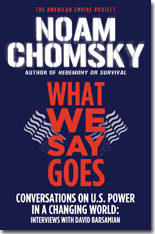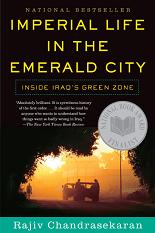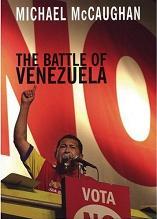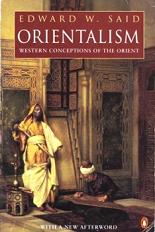
What We Say Goes
Noam Chomsky
223 pages including index
published in 2007
Noam Chomsky has been one of the most consistent critics of American hegemony and empire of the past four decades, maintaining a prodigious rate of output over the years as one of the few socalled public intellectuals who does not see his role as parroting received wisdom. His books, articles and interviews have always managed to explain in clear, understandable language how America and its ruling class keeps its power both domestically and abroad and particularly how it dictactes the boundaries of acceptable discourse. A measure of his importance as a critic of American power can be found in the vehemence of the criticism aimed at him by both conservative and liberal commentators. Despite their differences, both groups believe in American exceptionalism, the idea that America has a right, or even a duty to shape the rest of the world according to its own desires. What Chomsky has done for so long has been to show the reality behind “defending democracy” and “humanitarian intervention” and neither liberals nor conservatives like this.
What We Say Goes is his latest book, a collection of interviews he gave to David Barsamian about “U.S. power in a changing world”. It’s fair to say that there are few surprises here for those who’ve read his previous books, with the interview format used here precluding much indepth analysis. However, if you look at this book as an introduction to Chomsky and his concerns, What We Say Goes works fine. It’s short and to the point and as per usual Chomsky manages to cut to the heart of things quickly. He talks about all his usual obsessions — the way in which democracy and human rights are used against official enemies, the role of the US in the Middle East and South America, the role of the socalled free press in determining the boundaries of criticism allowed — and ties them together, with the interview format helping in keeping things rolling along.


